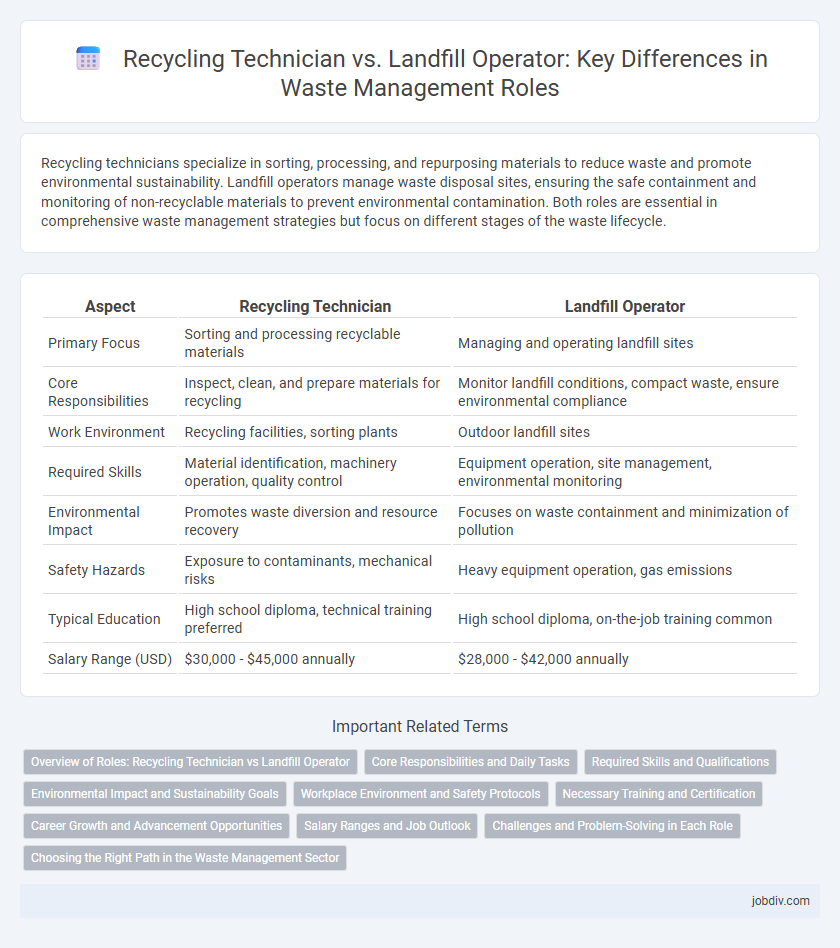Recycling technicians specialize in sorting, processing, and repurposing materials to reduce waste and promote environmental sustainability. Landfill operators manage waste disposal sites, ensuring the safe containment and monitoring of non-recyclable materials to prevent environmental contamination. Both roles are essential in comprehensive waste management strategies but focus on different stages of the waste lifecycle.
Table of Comparison
| Aspect | Recycling Technician | Landfill Operator |
|---|---|---|
| Primary Focus | Sorting and processing recyclable materials | Managing and operating landfill sites |
| Core Responsibilities | Inspect, clean, and prepare materials for recycling | Monitor landfill conditions, compact waste, ensure environmental compliance |
| Work Environment | Recycling facilities, sorting plants | Outdoor landfill sites |
| Required Skills | Material identification, machinery operation, quality control | Equipment operation, site management, environmental monitoring |
| Environmental Impact | Promotes waste diversion and resource recovery | Focuses on waste containment and minimization of pollution |
| Safety Hazards | Exposure to contaminants, mechanical risks | Heavy equipment operation, gas emissions |
| Typical Education | High school diploma, technical training preferred | High school diploma, on-the-job training common |
| Salary Range (USD) | $30,000 - $45,000 annually | $28,000 - $42,000 annually |
Overview of Roles: Recycling Technician vs Landfill Operator
Recycling Technicians specialize in sorting, processing, and managing recyclable materials to reduce waste sent to landfills, utilizing advanced machinery and quality control methods. Landfill Operators manage the daily operations of waste disposal sites, ensuring proper waste burial, environmental compliance, and maintenance of landfill infrastructure. Both roles are critical in waste management, with Recycling Technicians focusing on material recovery and Landfill Operators overseeing safe waste containment.
Core Responsibilities and Daily Tasks
Recycling Technicians primarily focus on sorting, processing, and managing recyclable materials such as paper, plastics, and metals to ensure efficient recovery and reduce landfill waste. Landfill Operators oversee the daily operations of waste disposal sites, including monitoring landfill conditions, managing waste compaction, and ensuring environmental compliance. While Recycling Technicians emphasize material recovery and sustainability, Landfill Operators concentrate on safe waste disposal and site maintenance.
Required Skills and Qualifications
Recycling Technicians require expertise in sorting materials, knowledge of environmental regulations, and proficiency with conveyor systems and shredders to efficiently process recyclable waste. Landfill Operators must possess skills in heavy equipment operation, landfill gas monitoring, and adherence to safety and environmental compliance standards. Both roles demand strong problem-solving abilities and understanding of waste management protocols to minimize environmental impact.
Environmental Impact and Sustainability Goals
Recycling Technicians contribute significantly to sustainability goals by sorting and processing recyclable materials, reducing landfill waste and conserving natural resources, which lowers greenhouse gas emissions. Landfill Operators manage waste disposal sites that contain non-recyclable materials, but their activities contribute to methane emissions and long-term environmental concerns. Emphasizing recycling practices over landfill dependence supports circular economy principles and enhances environmental impact mitigation.
Workplace Environment and Safety Protocols
Recycling Technicians operate in controlled environments with advanced sorting machinery and implement strict safety protocols against exposure to contaminants and equipment hazards. Landfill Operators work outdoors, often facing variable weather conditions and risks related to heavy machinery, gas emissions, and unstable ground. Both roles require adherence to OSHA standards, but Recycling Technicians typically benefit from cleaner, more regulated indoor settings compared to the higher physical and environmental risks encountered by Landfill Operators.
Necessary Training and Certification
Recycling Technicians require training in sorting techniques, material identification, and operation of recycling machinery, often supported by certifications such as OSHA safety standards or specialized waste management courses. Landfill Operators need certification in hazardous waste management, environmental regulations, and landfill gas monitoring, typically obtained through state-approved programs and the Solid Waste Association of North America (SWANA). Both roles demand comprehensive knowledge of environmental compliance but differ significantly in specialized training tailored to recycling processes versus landfill operations.
Career Growth and Advancement Opportunities
Recycling Technicians benefit from increasing demand in sustainable waste management, offering diverse career growth through specialization in materials recovery and environmental compliance. Landfill Operators experience steady employment with opportunities to advance into supervisory roles and environmental safety management, driven by regulatory requirements and operational efficiency. Both careers provide pathways for advancement, but Recycling Technicians have greater potential for development in emerging green technologies and sustainability initiatives.
Salary Ranges and Job Outlook
Recycling Technicians typically earn between $30,000 and $50,000 annually, benefiting from growing demand for sustainable waste management practices. Landfill Operators generally receive salaries ranging from $35,000 to $55,000, with steady job opportunities driven by ongoing landfill maintenance and regulatory compliance. Employment growth for Recycling Technicians is projected to increase faster than average due to rising environmental awareness, while Landfill Operators face more stable but slower job market expansion.
Challenges and Problem-Solving in Each Role
Recycling Technicians face challenges such as efficiently sorting diverse materials and troubleshooting machinery malfunctions to maximize recovery rates, while Landfill Operators manage complex environmental compliance issues and mitigate landfill gas emissions to reduce ecological impact. Both roles demand problem-solving skills for operational optimization: technicians optimize recycling processes through material identification technologies, whereas operators employ engineering controls and monitoring systems to maintain landfill stability and safety. Adapting to evolving waste regulations and integrating innovative technologies are critical for overcoming operational and environmental challenges in both positions.
Choosing the Right Path in the Waste Management Sector
Recycling Technicians specialize in sorting, processing, and repurposing recyclable materials to reduce landfill use and promote sustainability. Landfill Operators manage waste disposal sites, ensuring proper containment, environmental compliance, and operational safety to minimize pollution risks. Career choice depends on preferences for hands-on machinery operation and environmental impact, with recycling roles emphasizing material recovery and landfill roles focusing on waste containment and site management.
Recycling Technician vs Landfill Operator Infographic

 jobdiv.com
jobdiv.com